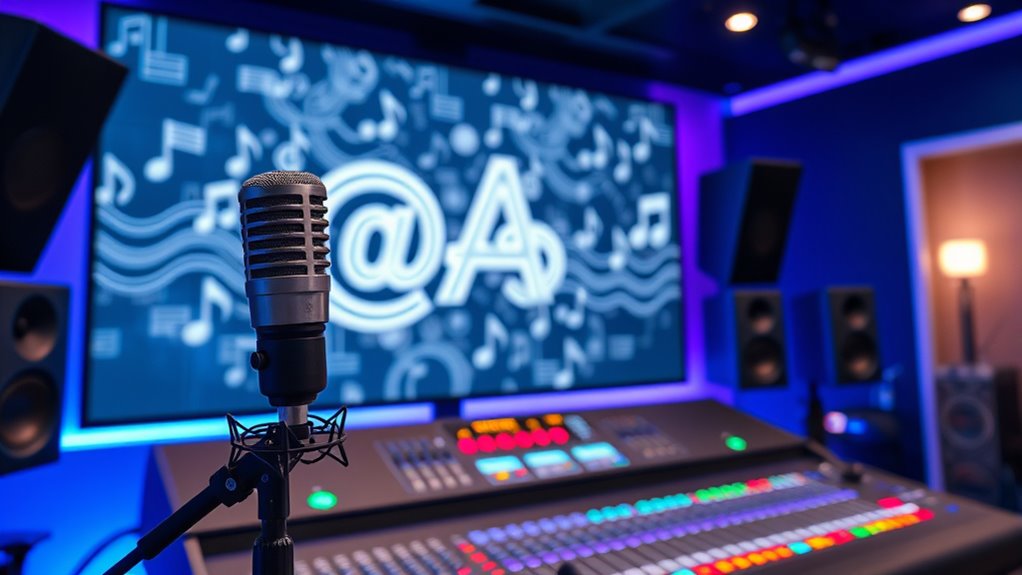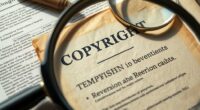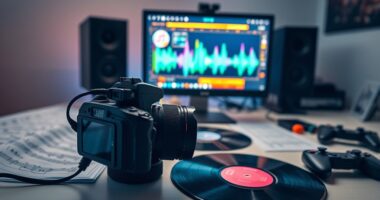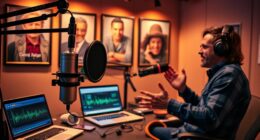Recent AI copyright rulings highlight that your rights as a musician depend on your level of human involvement in creating AI-assisted works. If you contribute substantially by setting parameters, editing, or directing the process, you can claim ownership. However, pure AI-generated content without human input may not be protected. Staying informed about legal developments, documenting your contributions, and choosing platforms that recognize your input are vital. Exploring these aspects further can help you better protect and monetize your music.
Key Takeaways
- Recent rulings emphasize that human contribution is essential for AI-generated music to qualify for copyright protection.
- Document your involvement in AI-assisted works to establish clear ownership rights.
- Choose AI tools that recognize and record your creative input to safeguard your rights.
- Stay informed about legal developments to adapt your licensing and distribution strategies effectively.
- Understand that some AI outputs may not be protected, so use contracts and licensing to secure your creations.

Recent AI copyright rulings are shaping the future of creative and intellectual property rights, raising questions about who owns works generated by machines. As a musician, you need to understand how these legal implications could impact your creative ownership. Courts are still figuring out how existing laws apply to AI-created content, and that creates both challenges and opportunities for artists like you. When AI tools assist in composing music or generating sounds, questions arise about whether you, as the creator, hold the rights, or if the machine’s output belongs to someone else. These rulings are essential because they define the boundaries of ownership and influence how you can monetize your work.
AI copyright rulings are redefining ownership and impacting how musicians protect and monetize their work.
One key legal implication is whether AI-generated music can be protected under copyright law. Traditionally, copyright requires human authorship, but with AI, the lines blur. If an AI system creates a piece without direct human input, courts may deny copyright protection, leaving your work in the public domain or making it difficult to defend your rights. Conversely, if you contribute substantially to the process—by setting parameters, selecting inputs, or editing outputs—you might claim creative ownership. This nuance impacts how you license your music and whether you can prevent others from copying or distributing AI-assisted compositions.
Understanding these legal implications helps you navigate the uncertain landscape of AI and copyright. For example, if you use AI tools to generate melodies, you should keep detailed records of your involvement. This documentation can be indispensable if disputes arise, proving your role in the creative process and supporting your claim of ownership. Additionally, staying informed about recent rulings can guide you in choosing the right tools and licensing agreements. Some AI platforms now specify the extent of human input needed for copyright eligibility, so selecting those that recognize your contributions can secure your rights.
The evolving legal landscape also affects your creative ownership in practical ways. As courts clarify what qualifies as original work, you might gain more control over AI-generated outputs. Alternatively, you may find that certain AI outputs are deemed non-copyrightable, which means you’d need to rely on other protections, like contracts or licensing terms. Understanding these nuances enables you to better protect your work and negotiate rights with AI developers or collaborators. Staying informed about content created by AI and the legal precedents surrounding it is crucial for protecting your intellectual property. Ultimately, staying proactive in understanding AI copyright rulings empowers you to adapt your creative process, safeguard your intellectual property, and maximize your earnings in an increasingly AI-driven music industry.
Frequently Asked Questions
How Will AI Copyright Rulings Impact Independent Musicians’ Income?
AI copyright rulings could reduce your income by complicating AI licensing and revenue sharing. If AI-generated music gains legal protections, you might face stricter licensing rules, limiting your ability to monetize AI collaborations. On the other hand, clearer regulations could open new revenue streams through licensing agreements. Stay informed about evolving laws to protect your rights and maximize earnings from AI-influenced music projects.
Can Musicians Use AI Tools Without Risking Copyright Infringement?
Using AI tools is like walking a tightrope—you can create freely but must stay balanced to avoid legal falls. You can use AI-generated content, but beware of sample legal disputes and licensing challenges. Always verify the source and obtain proper licenses to reduce infringement risks. Stay informed about copyright laws to protect yourself, and consider consulting a legal expert to navigate complex AI licensing issues confidently.
What Rights Do Musicians Have Over Ai-Generated Compositions of Their Work?
You have authorship rights and moral rights over AI-generated compositions based on your work. These rights mean you control how your music is used and can claim authorship even if an AI creates the piece. However, moral rights protect your personal connection to the work, ensuring attribution and preventing distortion. Stay aware of evolving regulations, and consider legal advice to safeguard your rights as AI tools become more prevalent in music creation.
Are There Specific Legal Protections for Ai-Created Music?
You should know that there are limited specific legal protections for AI-created music under current legal frameworks. Intellectual property laws primarily protect human creators, so AI-generated works often fall into grey areas. While some countries are developing new regulations, most existing laws don’t yet grant exclusive rights to AI-created compositions. Staying informed about evolving legal frameworks helps you understand your rights and how to protect your musical works in this rapidly changing landscape.
How Soon Will AI Copyright Laws Change to Accommodate New Technology?
You probably won’t see legal timelines speeding up anytime soon, despite the rapid pace of AI innovation. Policy updates often lag behind technological advances, leaving musicians in a whirlwind of uncertainty. While lawmakers scramble to keep up, expect slow progress in AI copyright laws. So, you might as well enjoy the waiting game, because changing regulations to fully accommodate new AI tech is likely to take much longer than you’d hope.
Conclusion
As AI continues to shape the music industry, staying informed about copyright rulings is essential. You need to understand how these laws affect your creations and rights. Are you ready to navigate this evolving landscape confidently? By keeping up with the latest rulings, you can protect your work and harness AI’s potential without fear. Embrace the change, and turn challenges into opportunities—after all, isn’t your music worth staying ahead of the curve?









